
Bernard Baumel, MD: Evaluating Stem Cells in Alzheimer Disease

Bernard Baumel, MD, and colleagues at the University of Miami have recently launched a clinical trial to examine the safety and efficacy of multiple doses of human mesenchymal stem cells in patients with Alzheimer disease.
“We believe that [stem cells] can improve the pathology of Alzheimer disease and help the brain repair itself in a number of ways.”
As the quest to better understand the pathogenesis of Alzheimer disease continues, some researchers are exploring a relatively new treatment route: stem cells.
Bernard Baumel, MD, assistant professor of neurology, chief, cognitive disorders division, and director, emory disorders clinical trials at the University of Miami, and colleagues have recently launched a new clinical trial to examine the safety and efficacy of multiple doses of human mesenchymal stem cells. Past research suggests that a single dose is safe, but Baumel and colleagues hope to glean the effects of multiple intravenous infusions over 1 year, including whether the dosing schedule prompts an immunological response. Baumel explained that if stems cells are shown to be an effective therapy in Alzheimer disease, they will have to be administered with regularity over the course of the disease in order to manage disease progression.
To learn more about this research, NeurologyLive spoke with Baumel at the 2019 Alzheimer's Association International Conference.
Newsletter
Keep your finger on the pulse of neurology—subscribe to NeurologyLive for expert interviews, new data, and breakthrough treatment updates.










